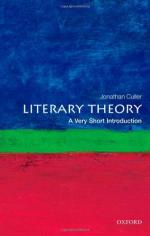
|
| Name: _________________________ | Period: ___________________ |
This quiz consists of 5 multiple choice and 5 short answer questions through Chapter 7, Performative Language.
Multiple Choice Questions
1. In Culler's opinion, to what is rhetoric related?
(a) Exaggeration.
(b) Blasphemy.
(c) Metaphor.
(d) Poetics.
2. According to Chapter 5, what is the goal in using a metaphor?
(a) To invoke emotion.
(b) To confuse with whimsy.
(c) To make the reader think.
(d) To outrage the reader.
3. According to Culler, when it comes to performative language, what is required to give a word or a phrase weight?
(a) Syllable count.
(b) Spelling.
(c) Repeatability.
(d) Origin.
4. What era defined rhetoric as the study of structuring powers for discussion?
(a) The Elizabethean Age.
(b) The Renaissance.
(c) Modern Times.
(d) The Dark Ages.
5. Literature, according to Culler, has the ability to do what for ideology?
(a) Destory it.
(b) Elevate it.
(c) All of these.
(d) Praise it.
Short Answer Questions
1. Based on "What is Theory?" which of the following words can be used to describe theory?
2. Who believed that linguists have the ability to help others speak, read, and understand never seen before words and sentence structures?
3. Culler suggests that the occasional confusion that results from the use of metaphor is due to __________.
4. What has literary theory helped add to the study of classics?
5. When a novel contains situations that should be intolerable, what are readers prompted to defy?
|
This section contains 229 words (approx. 1 page at 300 words per page) |

|




